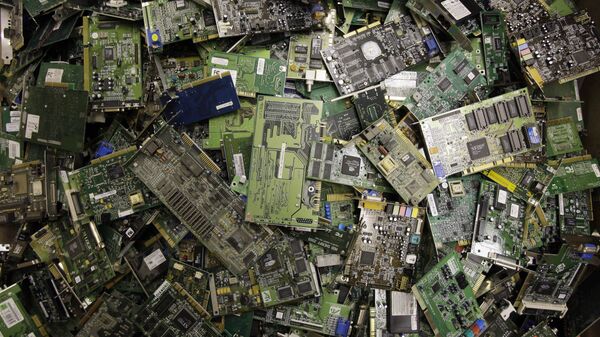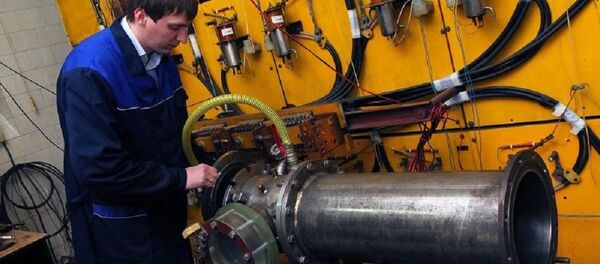Mobile devices and other electricals make up roughly 30 elements listed, with half predicted to become scare due to limited supplies, lack of capacity for recycling or locations in conflict areas, a press release said on Tuesday.
The European Chemical Society (EuChemS) set to launch an updated version of the chart before the European Parliament in Brussels on Tuesday at 14:30 to 16:30 CET, highlighting elements forecasted to run out in a century.
Scientists from St Andrews & @EUChemSoc develop a new periodic table to highlight the scarcity of elements used in smart mobiles & TVs
— University of St Andrews (@univofstandrews) January 22, 2019
The new periodic table will be launched at the @Europarl_EN today by MEP & past St Andrews Rector @C_Stihlerhttps://t.co/FZI8DzU1Bx#IYPT2019 pic.twitter.com/CfVn05qgTn
Emeritus professor of chemistry at the University of St. Andrews, Dr. Prof. David Cole-Hamilton, urged consumers to recycle unwanted electricals properly as roughly 10m smartphones are reportedly discarded in the EU.
"It is astonishing that everything in the world is made from just 90 building blocks, the 90 naturally occurring chemical elements," Professor Cole-Hamilton said. "There is a finite amount of each and we are using some so fast that they will be dissipated around the world in less than 100 years.
A periodic table chart discovered at the University of St Andrews is thought to be the oldest in the world.
— University of St Andrews (@univofstandrews) January 17, 2019
The chart of elements, dating from 1885, was discovered in the University’s School of Chemistry. https://t.co/xoRXwFhU4d
#IYPT2019 #evertoexcel pic.twitter.com/ykSlYc7rG0
"Many of these elements are endangered, so should you really change your phone every two years?"
The European Chemical Society, the umbrella organisation of organisations charged with uniting the European scientific community on policy issues in chemistry, urged legislators to address scarcity concerns and facilitate recycling trends to promote a circular economy in Europe.
"It is a lesson to us all to care for the world around us, as these naturally-occurring elements won't last forever unless we increase global recycling rates and governments introduce a genuine circular economy."
This year celebrate the 150th anniversary of Mendeleev’s #PeriodicTable of Chemical Elements. ⚗ Here is an overview of the countries which helped discover elements since the existence of the table. #ChemistryCan #iypt2019 pic.twitter.com/zEC4ffdK0g
— Cefic (@Cefic) January 18, 2019
Elemental Scarcity and the 'Right to Repair' Movement in the EU
European Environmental Bureau (EEB) spokesperson Mauro Anastasio told Sputnik that since 2007, over 7bn smartphones have been produced, with most US consumers using their mobiles for two years on average and increasing production straining finite global sources, especially in areas affected by "finance conflict".
"A recent study estimated that 70 kg of natural resources are needed to manufacture just one smartphone," Mr. Anastasio said. "The intensive extraction of natural resources pollutes air, water and soil along the way. Manufacturing, on the other hand, is responsible for almost three quarters of the phone’s total carbon emissions."
Mr. Anastasio also urged consumers to reuse, repair, and recycle electricals before the environment reaches "the point of no return", adding that governments should set standards to ensure access to key components when they fail, improve shock and water resistance, as well as making software updates and spare parts "available to all" to eliminate excessive product replacements.
"Once the product has reached the end of its life cycle and eventually becomes waste, it must then be recycled – but priority must be given to reuse and repair to avoid waste in the first place," Mr. Anastasio said.
Delivering waste: #Amazon France is under fire for destroying unsold goods 🇫🇷👉 https://t.co/U4Wop3KppH
— EEB (@Green_Europe) January 22, 2019
Last June, we reported similar accusations in Germany 🇩🇪 👉 https://t.co/8TaJLAdnzo
When will they end this nonsense? 😠
Mr. Anastasio said that the EU Ecodesign Directive outlines theoretical solutions to ensure that products are designed to be "easily repaired and recycled", adding that resource efficiency requirements for displays, lighting and white goods were discussed in December and January in Brussels, but "smartphones were not on the list of products to be discussed by policy makers".
However, manufacturers such as Fairphone and Puzzlephone have already committed to developing such products, he mentioned.
Tuesday's talks come as the international community commemorates the International Year of the Periodic Table of Chemical Elements, marking the 150th anniversary of the Periodic Table since it was discovered by Russian chemist Dmitry Mendeleev in 1869. The initiative has been supported by the International Union of Pure and Applied Physics (IUPAP), European Association for Chemical and Molecular Science (EuCheMS), the International Astronomical Union (IAU) and International Union of History and Philosophy of Science and Technology (IUHPS).





